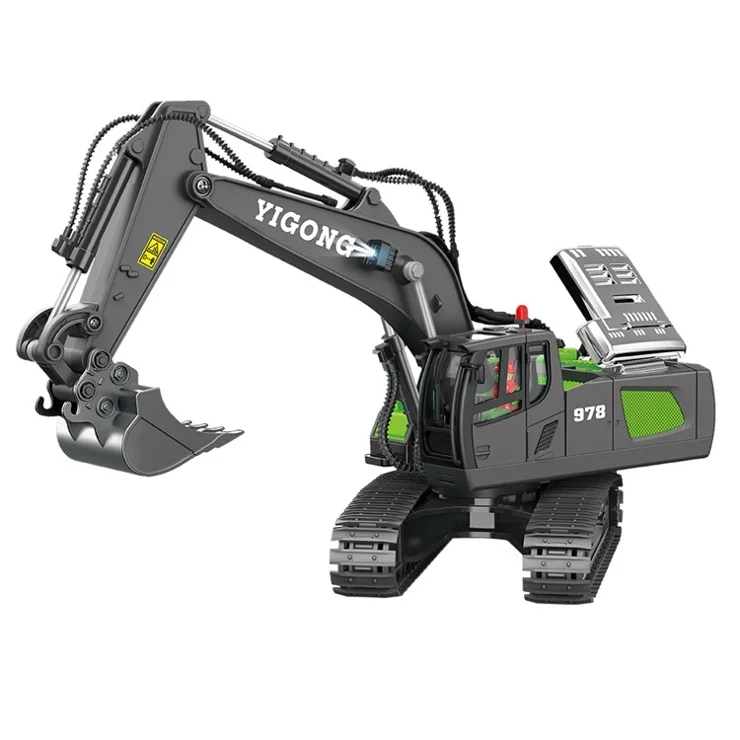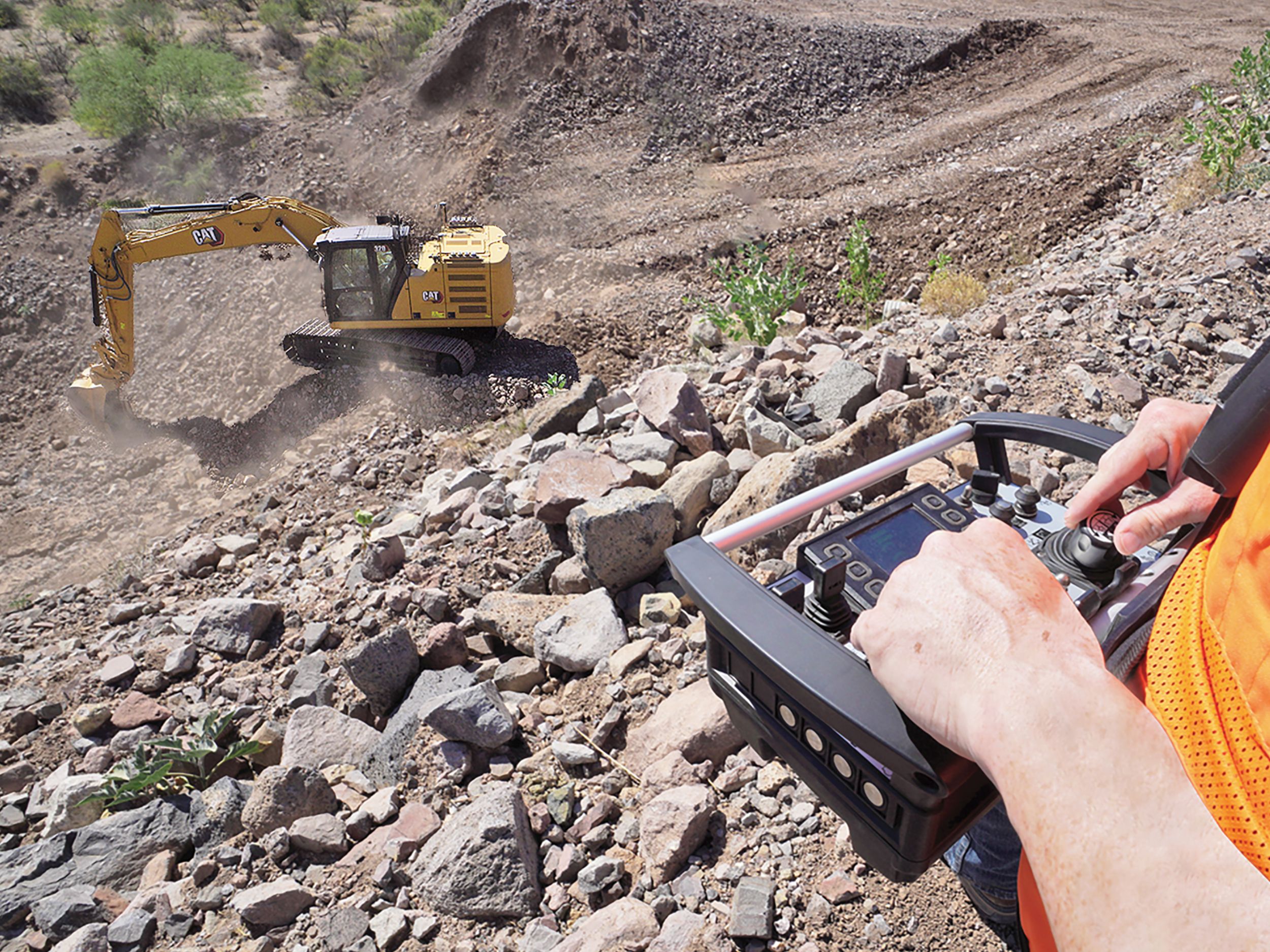Understanding How Excavator Works and Its Effect on Performance
Excavators play a vital duty in building and construction and mining operations, counting on an intricate interaction of hydraulic and mechanical systems. Their capability to perform a selection of tasks rests on both their style and the technology integrated within. Recognizing these elements can significantly impact functional effectiveness and performance. As improvements proceed to reshape the sector, one have to take into consideration exactly how these modifications will certainly influence future techniques and performance.
The Essentials of Excavator Mechanics

The Function of Hydraulic Systems in Excavators
At the heart of excavator operation exists the hydraulic system, which plays a critical duty in powering the device's activities and functions. This system makes use of pressurized hydraulic fluid to transfer energy, enabling different activities such as swinging, training, and excavating. By taking advantage of the concepts of hydraulics, excavators can execute jobs with amazing precision and pressure, boosting general operational efficiency.The hydraulic system contains crucial elements, consisting of shutoffs, pumps, and cyndrical tubes, which collaborate to control the flow and direction of the fluid. When the driver involves the controls, the hydraulic fluid is guided to certain cyndrical tubes, equating the operator's commands right into physical activity. This mechanism permits for receptive and smooth actions, which are necessary in building and excavation settings. double e volvo rc excavator. The effectiveness of the hydraulic system directly impacts the productivity and flexibility of the excavator, making it an indispensable aspect in contemporary excavation processes
Key Parts of an Excavator
Recognizing the key parts of an excavator is vital for realizing just how this powerful device runs. An excavator is composed of numerous considerable components, consisting of the undercarriage, residence, arm, boom, and pail. The undercarriage gives stability and wheelchair, usually including tracks or wheels to navigate different surfaces. The home has the engine and hydraulic systems, enabling the operator to manage activity and power the machine. The boom extends from the house, enabling upright reach, while the arm links to the container, promoting digging and training operations.Additionally, the cab houses the operator, outfitted with controls for specific handling. Each of these components plays an essential duty in the excavator's overall capability, adding to its efficiency and efficiency on construction websites. Comprehending these parts helps in maintaining and optimizing excavator efficiency, making certain jobs are completed safely and successfully.
Add-on Adaptability and Its Benefits
Add-on convenience is an essential aspect of excavators, making it possible for drivers to change between various tools tailored for details jobs. This flexibility not just improves task efficiency however also adds to cost-effectiveness by minimizing the requirement for numerous makers. Understanding the different types of add-ons available can significantly influence the overall performance and performance of an excavator on work sites.
Kinds of Add-ons
While excavators are primarily acknowledged for their digging abilities, their true versatility lies in the large variety of add-ons readily available. These add-ons boost the excavator's capability, allowing it to do numerous jobs past excavation. Common attachments consist of pails (for digging and scooping), hydraulic thumbs (for comprehending materials), and augers (for drilling openings) Grapples are utilized for handling and relocating particles, while rippers can break up tough surfaces. Various other specialized attachments, such as trenchers and rakes, enable excavators to adjust to particular work needs. This diversity not just boosts the equipment's energy throughout different sectors, including building and construction, demolition, and landscaping, yet additionally allows operators to tailor their tools to fulfill particular project demands successfully.
Raised Work Effectiveness
Making best use of task efficiency is a key benefit of making use of various excavator add-ons. Various add-ons permit an excavator to carry out multiple jobs without needing to switch equipment, conserving valuable time and labor. Using a hydraulic hammer can break concrete while a pail add-on can dig deep into soil, allowing a seamless operations. This flexibility minimizes downtime connected with devices changes and boosts productivity on-site. In addition, specialized accessories boost precision in jobs such as grading or landscaping, leading to greater top quality results. The ability to adjust to numerous work requirements not just enhances procedures but additionally decreases the need for additional equipment, making certain that jobs are finished quickly and properly. Overall, add-on versatility significantly contributes to raised job efficiency in excavation work.
Cost-Effectiveness and Convenience
Cost-effectiveness is a significant advantage of making use of versatile excavator attachments. These add-ons enable a single excavator to execute several jobs, reducing the demand for additional machinery and labor - double e volvo rc excavator. By switching in between containers, hammers, and grapples, drivers can tackle numerous tasks, from digging to demolition, thus making best use of tools use. This flexibility not only decreases operational expenses but likewise minimizes downtime related to changing equipment. In addition, the ability to tailor excavators with specialized attachments improves efficiency, as they can efficiently manage diverse jobs according to job needs. To wrap up, the combination of cost-effectiveness and versatility in excavator attachments adds to boosted operational effectiveness and resource appropriation in building and construction and excavation jobs

Advanced Innovation in Modern Excavators
Modern excavators are increasingly geared up with sophisticated innovation that changes excavation procedures. Automation simplifies procedures, while improved gas performance lowers operational expenses. Furthermore, clever control systems boost accuracy and safety and security, noting a substantial development in excavation equipment.
Automation in Excavation Processes
As excavation technology develops, automation has actually become an essential element in boosting performance and precision on task sites. Modern excavators are equipped with advanced automated systems that help with jobs such as grading, excavating, and trenching with marginal operator treatment. These systems make use of sensing units, GPS, and machine learning formulas to guarantee precise placing and deepness control, greatly minimizing the margin for mistake. Additionally, automation permits operators to concentrate on calculated decision-making as opposed to hands-on controls, resulting in boosted efficiency on the whole. Such developments not just simplify operations however additionally improve safety and security by lessening human mistake in complex operations. Subsequently, the assimilation of automation in excavation procedures stands for a considerable advancement in building innovation, driving the sector in the direction of higher performance and efficiency.
Boosted Gas Efficiency
Innovations in innovation have additionally led to considerable enhancements in fuel effectiveness for modern excavators. Modern machines are geared up with advanced engines that maximize power result while reducing gas intake. These engines utilize innovative combustion innovations, such as turbocharging and direct fuel injection, to boost performance and effectiveness. Furthermore, lightweight products in construction lower total weight, enabling much less power expense during operation. The intro of variable rate controls enables operators to go to this web-site change engine performance according to particular tasks, better lessening fuel use. As an outcome, these improvements not just lower operational costs but also add to environmental sustainability by reducing discharges. Generally, improved fuel performance in excavators is an essential growth that boosts efficiency and economic practicality in the construction industry.
Smart Control Equipment
While drivers browse progressively complicated work sites, clever control systems in excavators have become vital devices for enhancing effectiveness and accuracy. These innovative technologies make use of algorithms and sensors to keep track of different parameters such as lots weight, surface conditions, and operational performance. By automatically adjusting hydraulic functions, smart systems enhance equipment performance, resulting in improved productivity and reduced endure parts. Additionally, drivers benefit from instinctive user interfaces that provide real-time feedback and diagnostics, enabling for educated decision-making. This assimilation of modern technology not only streamlines operations however also lessens human error, adding to much safer workplace. As the building industry proceeds to develop, clever control systems will certainly play a crucial role fit the future of excavator efficiency and performance.
Enhancing Functional Effectiveness With Excavators
Excavators play an essential duty in improving operational performance across different construction and excavation projects. Their adaptability allows for several tasks, consisting of product, lifting, and digging handling, which simplifies operations and minimizes the demand for extra equipment. With powerful hydraulic systems, excavators can carry out heavy-duty jobs with accuracy, considerably reducing the moment required to total tasks. The combination of innovative modern technology, such as general practitioner and automated controls, further maximizes their procedure, enabling drivers to attain higher accuracy and lower material waste. Furthermore, modern-day excavators are developed to take in less gas and lessen discharges, adding to both cost savings and environmental sustainability. By click over here utilizing excavators effectively, building and construction groups can enhance efficiency, meet project deadlines, and enhance total website administration. This multifunctionality and efficiency make excavators crucial devices in the contemporary construction landscape.
The Future of Excavators in Construction and Mining Industries
As the construction and mining markets progress, the future of excavators is poised for considerable transformation driven by technological development and transforming operational demands. Advancements in automation and fabricated intelligence are improving excavator abilities, enabling boosted accuracy and efficiency in procedures. Self-governing excavators are emerging, minimizing the requirement for human intervention and lessening the risk of accidents.Moreover, the assimilation of telematics and IoT modern technology makes it possible for real-time monitoring of machine performance and anticipating upkeep, optimizing uptime. Environment-friendly designs, consisting of hybrid and electric designs, are gaining traction, aligning with sustainability goals within the industry.Additionally, making use of advanced materials and lighter styles enhances fuel performance while maintaining performance criteria. As these patterns development, excavators will certainly play a vital function in fulfilling the boosting demands for performance and security in building and mining, inevitably changing functional landscapes.
Regularly Asked Concerns
Exactly How Do Climate Condition Impact Excavator Efficiency?

Climate condition significantly influence excavator efficiency, as rainfall and mud can prevent traction and security, while severe temperatures may influence hydraulic systems. Operators has to adapt to these variables to guarantee perfect functionality and security during operations.
What Precaution Should Operators Follow While Utilizing Excavators?
Precaution for excavator operators include wearing ideal individual protective devices, conducting pre-operation assessments, making certain appropriate interaction with ground workers, maintaining a risk-free distance from above threats, and sticking to well-known operational procedures to avoid accidents.
How Typically Should Excavators Be Maintained for Optimal Performance?
Excavators should be preserved routinely to guarantee peak efficiency, typically every 250 operating hours or as specified by the manufacturer. Routine checks boost integrity, protect against unexpected malfunctions, and extend the lifespan of the equipment.
What Is the Average Life-span of an Excavator?
The average lifespan of an excavator typically varies from 10,000 to 15,000 hours of operation. Aspects influencing longevity include upkeep practices, operating conditions, and the top quality of the device itself, affecting overall performance and efficiency.

Can Excavators Operate Uneven Terrain Effectively?
Excavators can run properly on unequal terrain as a result of their articulated designs and adjustable tracks. These functions allow them to preserve stability and traction, making it possible for reliable procedure in tough settings commonly experienced in building and construction and landscape design tasks. Each of these elements plays an important duty in the excavator's general functionality, adding to its efficiency and efficiency on building and construction sites. Optimizing work effectiveness is a main benefit of using different excavator add-ons. While drivers browse progressively complex work websites, smart control systems in excavators have actually arised as essential tools for enhancing efficiency and accuracy. Excavators play a vital role in boosting functional effectiveness across different construction and excavation jobs. Advancements in automation and artificial intelligence are reshaping Recommended Reading excavator capacities, allowing for boosted precision and efficiency in procedures.